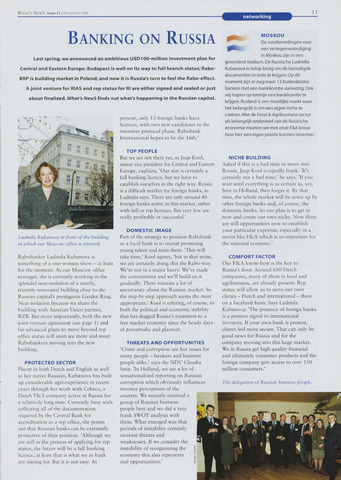Banking on Russia
WHAT'S NewS Issue 11 November 1996
networking
11
MOSKOU
De voorbereidingen voor
een vertegenwoordiging
in Moskou zijn in een
gevorderd stadium. De Russische Ludmilla
Kubanova is volop bezig om de benodigde
documenten in orde te krijgen. Op dit
moment zijn er nog maar 13 buitenlandse
banken met een banklicentie aanwezig. Ook
wij hopen op termijn een banklicentie te
krijgen. Rusland is een moeilijke markt waar
het belangrijk is om een eigen niche te
creëren. Met de Food Agribusiness sector
als belangrijk onderdeel van de Russische
economie moeten we met onze F&A know
how hier een eigen positie kunnen innemen.
Last spring, we announced an ambitious USD1 OO-million investment plan for
Central and Eastern Europe. Budapest is well on its way to full branch status; Rabo-
BRP is building market in Poland; and now it is Russia's turn to feel the Rabo-effect.
A joint venture for RIAS and rep status for Rl are either signed and sealed or just
about finalized. What's NewS finds out what's happening in the Russian capital.
present, only 13 foreign banks have
licences, with two new candidates in the
intention protocol phase. Rabobank
International hopes to be the 16th.'
Ludmila Kubanova in front of the building
in whicb our Moscow office is situeted.
Rabobanker Ludmila Kubanova is
something of a one-woman show - at least
for the moment. As our Moscow office
manager, she is currently working in the
splendid near-isolation of a stately,
recently renovated building close to the
Russian capital's prestigious Garden Ring.
Near-isolation because we share the
building with Austrian Unico partner,
RZB. But more importantly, both the new
joint venture agreement (see page 1) and
far-advanced plans to move beyond rep
office status will soon see more and more
Rabobankers moving into the new
building.
PROTECTED SECTOR
Fluent in both Dutch and English as well
as her native Russian, Kubanova has built
up considerable agri-experience in recent
years through her work with Cebeco, a
Dutch F&A company active in Russia for
a relatively long time. Currently busy with
collecting all of the documentation
required by the Central Bank for
accreditation as a rep office, she points
out that Russian banks can be extremely
protective of their position. 'Although we
are still in the process of applying for rep
status, the future will be a full banking
licence, at least that is what we as bank
are aiming for. But it is not easy. At
NICHE BUILDING
Asked if this is a bad time to move into
Russia, Jaap Kool is equally frank. 'It's
certainly not a bad time,' he says. 'If you
wait until everything is as certain as, say,
here in Flolland, then forget it. By that
time, the whole market will be sown up by
other foreign banks and, of course, the
domestic banks. So our plan is to get in
now and create our own niche. Now there
are still opportunities now to establish
your particular expertise, especially in a
sector like F&A which is so important for
the national economy.'
COMFORT FACTOR
Our F&A know-how is the key to
Russia's door. Around 600 Dutch
companies, many of them in food and
agribusiness, are already present. Rep
status will allow us to serve our own
clients - Dutch and international - there
on a localized basis. Says Ludmila
Kubanova: 'The presence of foreign banks
is a positive signal to international
investors. If your own bank is present,
clients feel more secure. That can only be
good news for Russia and for the
company moving into this huge market.
We in Russia get high quality financial
and ultimately consumer products and the
foreign company gets access to over 150
million consumers.'
The delegation of Russian business people.
TOP PEOPLE
But we are not there yet, as Jaap Kool,
senior vice president for Central and Eastern
Europe, explains. 'Our aim is certainly a
full banking licence, but we have to
establish ourselves in the right way. Russia
is a difficult market for foreign banks, as
Ludmila says. There are only around 40
foreign banks active in this market, either
with full or rep licences. But very few are
really profitable or successful.'
DOMESTIC IMAGE
Part of the strategy to position Rabobank
as a local bank is to recruit promising
young talent and train them. 'This will
take time,' Kool agrees, 'but in that sense,
we are certainly doing this the Rabo-way.
We're not in a major hurry. We've made
the commitment and we'11 build on it
gradually. There remains a lot of
uncertainty about the Russian market. So
the step-by-step approach seems the most
appropriate.' Kool is refering, of course, to
both the political and economie stability
that has dogged Russia's transition to a
free market economy since the heady days
of perestroika and glasnost.
THREATS AND OPPORTUNITIES
'Crime and corruption are hot issues for
many people - bankers and business
people alike,' says the NDS' Claudia
Smit. 'In Holland, we see a lot of
sensationalized reporting on Russian
corruption which obviously influences
investor perceptions of the
country. We recently received a
group of Russian business
people here and we did a very
frank SWOT analysis with
them. What emerged was that
periods of instability certainly
increase threats and
weaknesses. If we consider the
instability of reorganizing the
economy this also represents
real opportunities.'

